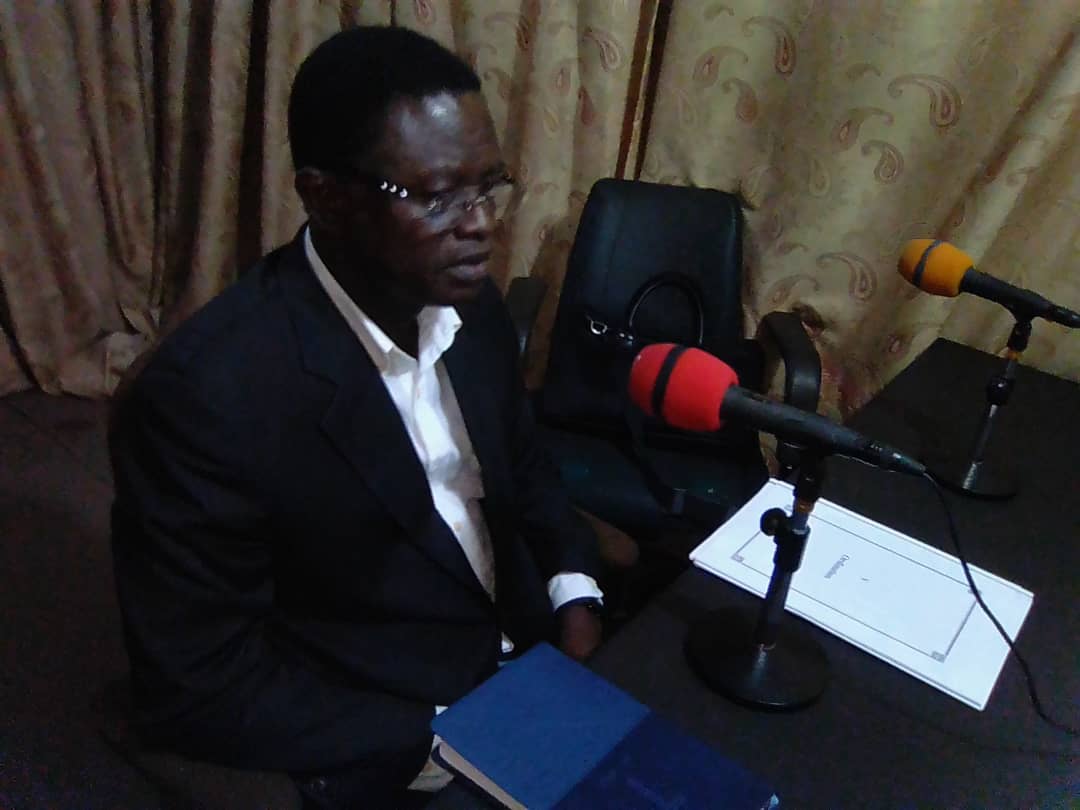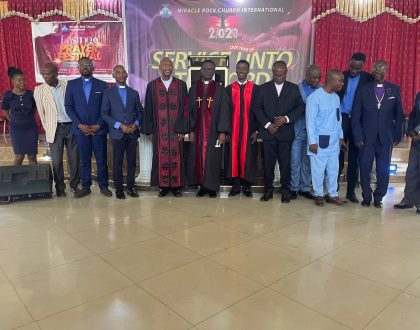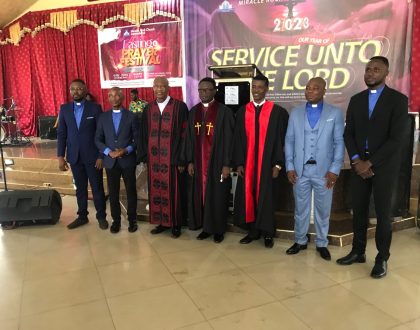On Air: Aseda 105.9 FM Radio Station (Takoradi City)

by Ed Arcton
30th November 2018
Rev Arcton arrives at Takoradi City, by noon time Friday. An hour later himself, Rev Forson and Rev Chris. Anoquampong (Our host) were on Air to talk about Ordination at Aseda 105 FM Radio Station, Takoradi/Sekendi City. We have a fruitful discussion on the Topic. The responses and feedback were very encouraging.
Some of the questions many want to know are;
- What is Ordination?
- Who is to be Ordain?
- It is Necessary to be Ordain?
- What is the procedure for Ordination?
- Can anything hinder one from being Ordain?
- Who ordains the candidate?
- What is the role of the local Church?
These and many other questions were discussed thoroughly. Rev Arcton and Rev Forson provide adequate answers to the above questions to our listens.
The Highlight of our Talk on Radio FM Station is as fellows
Ordination as Recognition of Spiritual Leadership
A strong biblical doctrine of the ministry of the laity may at first appear to diminish the necessity and importance of an ordained clergy, those who are specially set apart for the leadership of the church. To the contrary, it actually heightens the need, for the laity must be spiritually formed, trained, and led on a massive scale if the mission of the church is to be accomplished. Scripture emphasizes that ministry leaders are Christ’s gifts (doma) for the explicit purpose of preparing the people of God for their ministries of building up the church (Ephesians 4:7-12).
The selection and preparation of spiritual leaders is a crucial matter throughout the New Testament. Jesus’ appointment and nurture of the first apostles provided servant leaders who exercised a vital leadership role in the Early Church. The Twelve were also aided by men like Stephen (Acts 6), Philip (Acts 8), and Barnabas (Acts 13), whom the Spirit singularly marked out for leadership in advancing the mission of the church. These and others are to be found among an expanding leadership group in the New Testament.
Paul and Barnabas were careful to appoint elders for leadership in each new church (Acts 14:23). For that appointment, Luke used a verb (cheirotoneō) which means “to choose, to appoint or elect by raising hands.” Thus the congregations may well have had a part in the selection, as in the choice of the “seven” in the Jerusalem church (Acts 6:1-6). These appointments were made in a context of prayer, fasting, and apparently with some kind of public “ordination” service.
Divine initiative in the appointment of spiritual leaders is basic to New Testament theology. Instructing his churches, Paul wrote, “And God has appointed in the church, first apostles, second prophets, third teachers, then miracles, then gifts of healings, helps, administrations, various kinds of tongues” (1 Corinthians 12:28, NASB).
First, note that these “offices” (or “ministries”) are of divine origin. Second, they are arranged in specific order—first apostles, second prophets, third teachers, then Spirit gifted individuals with a wide array of spiritual gifts, both miraculous (e.g., “healing” and “tongues”) and functional (e.g., “administration”) Third, all these ministries are charismatic in nature, in that they are granted and energized as specific gifts of God by His Spirit. Fourth, the ministries of both the “leaders” and the “led,” the “pastors” and the “parishioners,” flow from the charismata, the spiritual gifts.
Paul wrote in much the same way in his letter to Ephesus. “It was he who gave some to be apostles, some to be prophets, some to be evangelists, and some to be pastors and teachers” (Ephesians 4:11). These ministries are not provided by human initiative but by the grace (charis [4:7]) of the risen Lord Jesus Christ who “gave gifts (doma) to men” (4:8). Moreover, Christ’s gifts of ministry leaders are granted “to prepare God’s people for works of service (diakonia), so that the body of Christ may be built up until we all reach unity in the faith and in the knowledge of the Son of God and become mature, attaining to the whole measure of the fullness of Christ” (Ephesians 4:12,13).
Ordination of Ministry Leaders
The selection of spiritual leaders throughout Scripture is normally recognized in a public way that signifies the spiritual origins of the call. In the Old Testament, a formal anointing with oil, bringing with it the power of the Spirit, accompanied God’s selection. Jesus purposefully drew the 12 disciples aside and appointed them to be apostles (Mark 3:13-19). Judas’ successor was prayerfully and publicly chosen (Acts 1:15-22). When the seven deacons were chosen, the apostles prayed and “laid their hands on them” (Acts 6:6). Similarly, the Spirit announced his choice of Paul and Barnabas for missionary service, a choice followed by fasting, prayer, and the laying on of hands (Acts 13:2,3). Paul’s letters to Timothy, who represents a younger generation of ministers, imply a kind of formal ordination. At some unidentified point, Paul and a body of elders laid hands on Timothy to set him apart for the ministry. The work of the Spirit in Timothy’s ordination is also noteworthy, “Do not neglect your gift (charisma), which was given you through a prophetic message (prophēteia) when the body of elders laid their hands on you” (1 Timothy 4:14). Moreover, Paul continued to mentor his young colleague, “fan into flame the gift (charisma) of God, which is in you through the laying on of my hands” (2 Timothy 1:6). The practice of selecting and “ordaining” qualified elders, crucial to the success of the missionary churches, became a strategic step for Paul’s ministry team. Following the pattern of his first missionary journey (Acts 14:23), Paul commanded Titus, charged with setting the churches of Crete in order, “appoint elders in every town” (Titus 1:5). Timothy, likewise, had as a part of his ministry similar tasks in the appointment and supervision of elders (1 Timothy 5:17-22)
Biblical Qualifications of Pastor
The Bible specifically speaks about the qualifications for those who will lead a congregation of people. These qualifications have been the same for almost 2,000 years. Jesus is the perfect fulfillment of these qualifications as the “senior pastor” of the Church.

Rev Arcton on Air, Live at Aseda 105 FM, Takoradi City
Above Reproach
This is the overarching, summarizing characteristic. You will find similar (but not identical) lists in First Timothy and Titus. Living a life above reproach is the first requirement in both lists and Titus repeats it. The other items on the list explain what “above reproach” means. If we peruse the two lists, as well as First Peter, we find 17 qualifications of an elder who is above reproach.
- A pastor must be devoted to his wife; one-woman man (Titus 1:6; 1 Tim 3:2). The pastor’s marriage illustrates Christ’s love for His church—His bride ( 5:22ff.). A Pastor must love his wife exclusively with his mind, will and emotions and not just his body.
- A pastor’s children must be in submission, though not perfect (Titus 1:6; 1 Tim 3:4-5). If a man does not know how to manage his own family, he will not know how to take care of God’s church. The first flock for a pastor is his own family as Pastor Dad. A Pastor’s qualification for the church starts in his home management as he leads them up in the discipline and admonition of the Lord ( 6:4).
- A pastor is a faithful steward (Titus 1:7). Here the term used is overseer (Greek episkopos). It is not another office, but a functional title of the elder. It is what he does. He is a steward, a manager of God’s resources and Jesus’ flock. He takes responsibility, but not ownership.
- A pastor must be humble — not arrogant (Titus 1:7). A pastor must constantly demonstrate the gospel by admitting when he is wrong and assuming responsibility and restoring relationships.
- A pastor must be gentle — not quick-tempered (Titus 1:7; 1 Tim 3:3). No man will be of any use in the kingdom that is quick-tempered. The difference between how Jesus demonstrated anger is that He was angry at the abuse of others in the name of religion and the dishonoring of God. We get angry at how it affects us.
- A pastor must be sober — not a drunkard (Titus 1:7; 1 Tim 3:3). This is not just overindulgence in alcohol but is idiomatic for any behavior that fuels addictive responses.
- A pastor must be peaceful — not violent (Titus 1:7; 1 Tim 3:3). A pastor is prone to inflict violence through his words. He is to be a peacemaker.
- A pastor must have financial integrity — not greedy for gain (Titus 1:7; 1 Tim 3:3; 1 Peter 5:3). A pastor is to be upright in his financial dealings and not accused of pursuing money over the kingdom of God.
- A pastor must be hospitable (Titus 1:8; 1 Tim 3:2). A pastor’s home is to be open for others to enjoy. A pastor’s home is not a heaven on earth, but rather a place of ministry.
- A pastor must be a lover of good (Titus 1:8). A pastor genuinely loves what is good. He does not just think he should love it.
- A pastor must be self-controlled (Titus 1:8; 1 Tim 3:2). Self-control is a characterization of every area of a pastor’s life: diet, time, mouth, exercise, relationships, sex, and money.
- A pastor must be upright (Titus 1:8). He has integrity in his relationships and in how he treats others.
- A pastor must be holy (Titus 1:8). His life is devoted wholeheartedly to Jesus externally and internally.
- A pastor must be able to teach (Titus 1:9; 1 Tim 3:2). All of the other qualifications are character qualities. This is the only ability-based requirement. He is to be able to teach sound doctrine, not just be able to communicate in an excellent manner. His teaching can be to one or two, to twenty, to a hundred or to a thousand. Most of the churches in Crete were house churches. The elders were to defend the faith once delivered to the saints against the numerous false teachers that arose.
- A pastor must be spiritually mature (1 Tim 3:6). Positions of authority without spiritual maturity lead to the trap of pride. When pride grows in a man, sin abounds.
- A pastor must be respectable (1 Tim 3:7). That does not mean that everyone must like him or even appreciate him. It means that there is no credible witness to an ongoing sinful behavior.
- A pastor must be an example to the flock (1 Peter 5:3). Elders are examples of biblical expressions sexually, time management, marriage, parenting, worship, relationships and any other way. A pastor should be someone your sons could pattern their life after and the kind of man your daughter should marry.
Conclusion
What would you do if an elder violates one of these requirements? 1 Timothy 5:19-20 warns us not to accuse an elder flippantly. Matthew 18:15-18 gives us the steps: 1) Go to the elder alone, 2) If still unsatisfied, go with another person, 3) If still unsatisfied, let the greater eldership know. If accusations are verified and the elder remains unrepentant, rebuking that elder before all is the next biblical step.
Recommended Posts

THE CHALLENGE AND URGENT NEED
May 29, 2023

The Workers Are Few.
May 29, 2023

Graduation and Ordination Service
May 28, 2023
